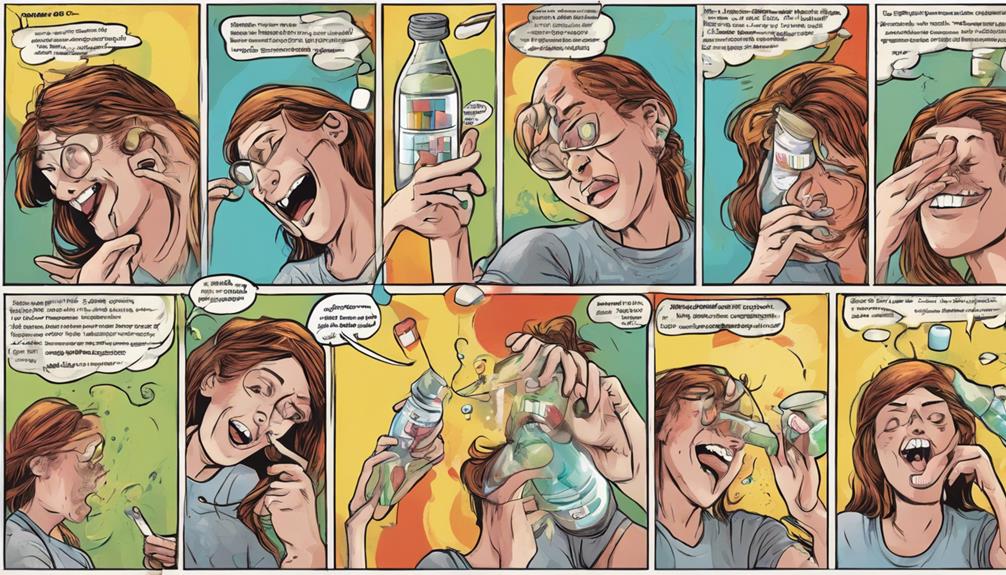Hey there, are you prepared for a detour to student success? Detentions can actually be a secret weapon in improving behavior and grades. These sessions address issues like tardiness and missed homework, setting clear expectations and providing feedback to help with improvement. Personalized plans and teacher support can make a significant difference. Need help with homework? Create a designated study area, use a planner, and remember to take breaks. Don’t forget about Richard Rogers’ Online Community for additional guidance. Detentions can truly be a pathway to a brighter academic future. Feeling excited? Keep exploring for more valuable tips!
Key Takeaways
- Implement detentions for behavior correction and academic improvement.
- Ensure fair, consistent detentions to address specific issues.
- Communicate detention purpose, expectations, and feedback effectively.
- Provide follow-up support to sustain student progress.
- Personalize detentions with individual behavior plans and academic support.
Detentions for Behavior Correction

Implementing detentions for behavior correction is an essential aspect of maintaining discipline and fostering a positive learning environment in schools. Detentions serve as a tool to address disruptive behavior, lateness, incomplete homework, and poor attendance.
By holding students accountable for their actions, detentions reinforce respect for teachers and peers while encouraging responsibility. When used effectively, detentions can help students reflect on their behavior and make positive changes.
For instance, Christopher's experience showcases how detentions, when used thoughtfully, can lead to improved work ethic and academic performance. Remember, detentions should be fair, consistent, and focused on resolving specific issues to promote a supportive and conducive learning environment for all students.
Importance of Communication
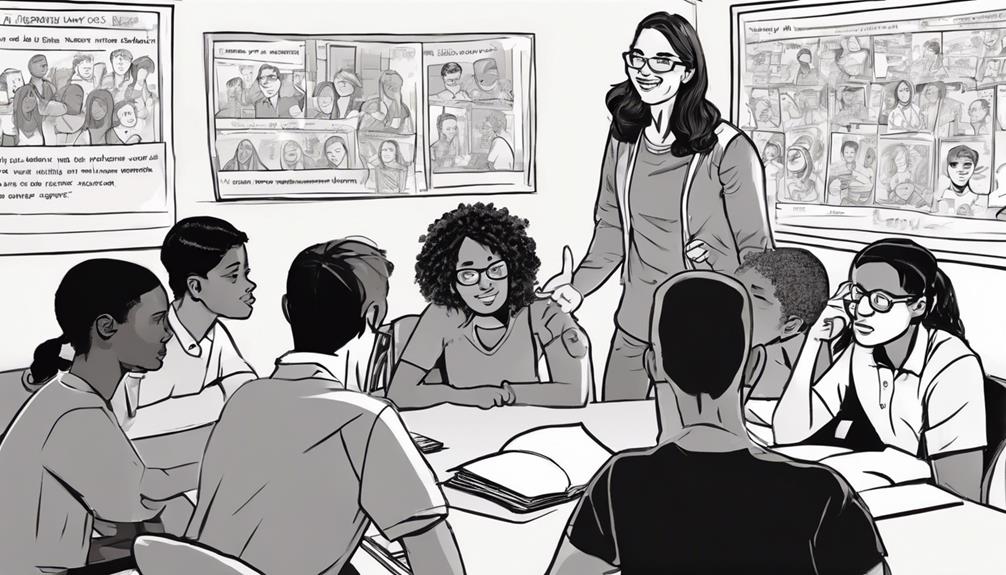
Effective communication with students is essential to the success of detention interventions in promoting behavior correction and academic improvement. When you clearly explain the reasons behind a detention, students are more likely to understand the importance of their actions and aim to improve. Here's a table to highlight the key aspects of communication in detentions:
| Importance of Communication | Examples |
|---|---|
| Clarifying Detention Purpose | Explaining how the detention helps address specific behavior issues. |
| Setting Expectations | Clearly outlining what is expected from the student during and after the detention. |
| Providing Feedback | Offering constructive feedback on behavior improvements and academic progress. |
Follow-Up and Support

For successful outcomes in detention interventions, consistent follow-up and support are essential components to guarantee sustained student improvement. After a student serves detention, it's important to check in periodically to see how they're doing. This follow-up shows that you care and are invested in their progress.
You could schedule brief meetings, send encouraging notes, or even provide additional academic support if needed. By offering ongoing support, you can help students stay on track and prevent future detentions. Remember, a little encouragement can go a long way in motivating students to do better.
Personalized Approach in Detentions
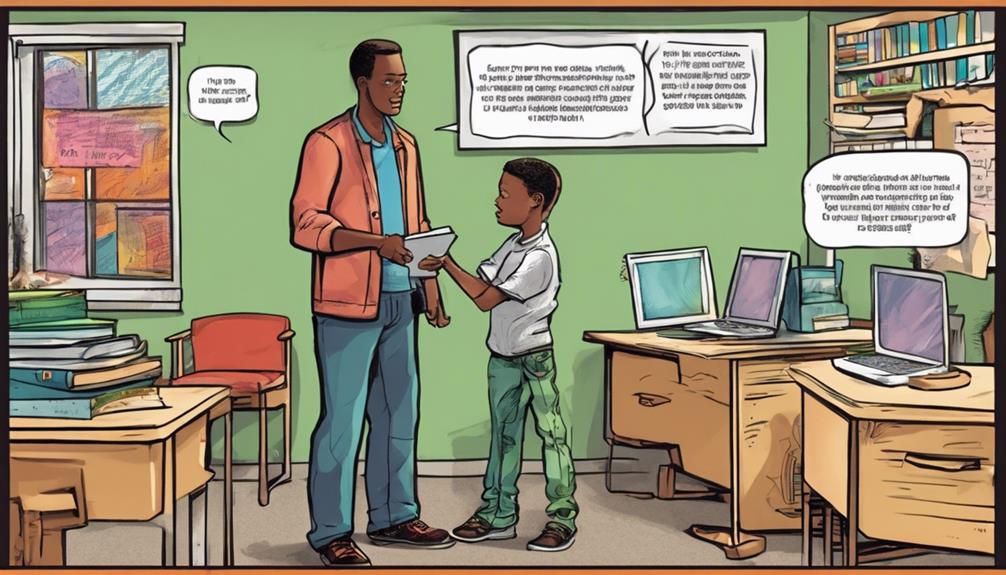
To enhance student outcomes, detentions should be tailored to address individual behavior and academic needs. Personalized approaches in detentions can make a significant difference in helping students improve.
Here are some ways to personalize detentions:
- 1. Individual Behavior Plans: Creating specific behavior plans for each student can target problem areas effectively.
- 2. Academic Support Sessions: Offering extra academic support during detention hours can help students catch up on missed work.
- 3. One-on-One Discussions: Engaging in open discussions with students about their behavior can foster a sense of responsibility.
- 4. Goal Setting: Setting achievable goals with students during detentions can motivate them to work towards improvement.
Individual Teacher Administration

Administering detentions individually allows teachers to tailor interventions to meet students' specific needs and foster targeted improvements. When detentions are personalized, teachers can address the root causes of behavior issues or academic struggles effectively. Here's a table illustrating how individual teacher administration can benefit students:
| Benefits of Individual Teacher Administration |
|---|
| 1. Personalized approach to student needs |
| 2. Tailored interventions for improvement |
| 3. Enhanced student-teacher communication |
Strategies for Homework Management
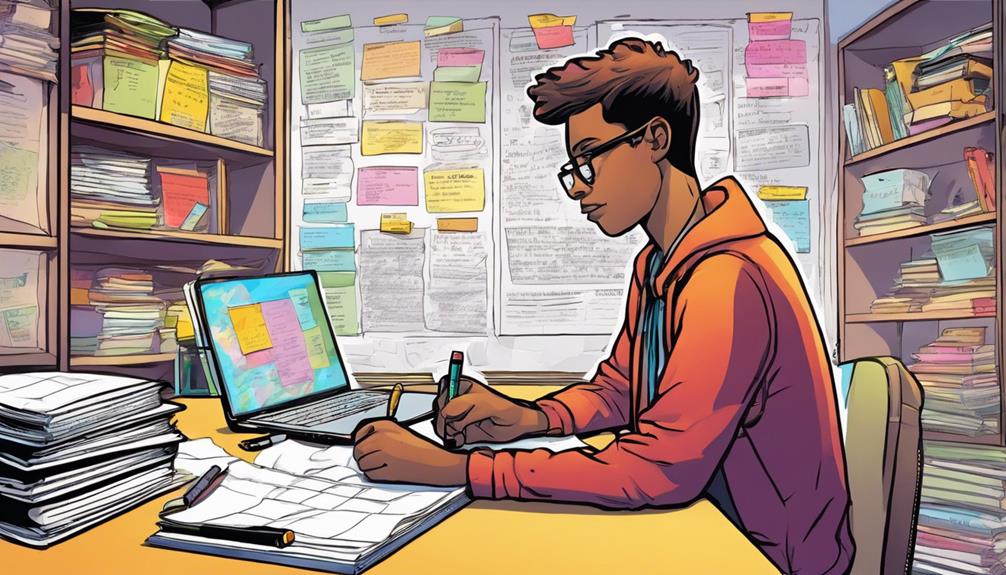
Implementing effective strategies for managing homework is essential for fostering student academic success. Here are some tips to help you stay on top of your assignments:
- Create a designated study space: Find a quiet, well-lit area where you can focus and avoid distractions.
- Use a planner or digital app: Stay organized by writing down deadlines and breaking tasks into manageable chunks.
- Prioritize tasks: Start with the most challenging assignments first to make sure you have enough time to complete them.
- Take breaks: Remember to give yourself short breaks to recharge and maintain focus.
Online Community Engagement
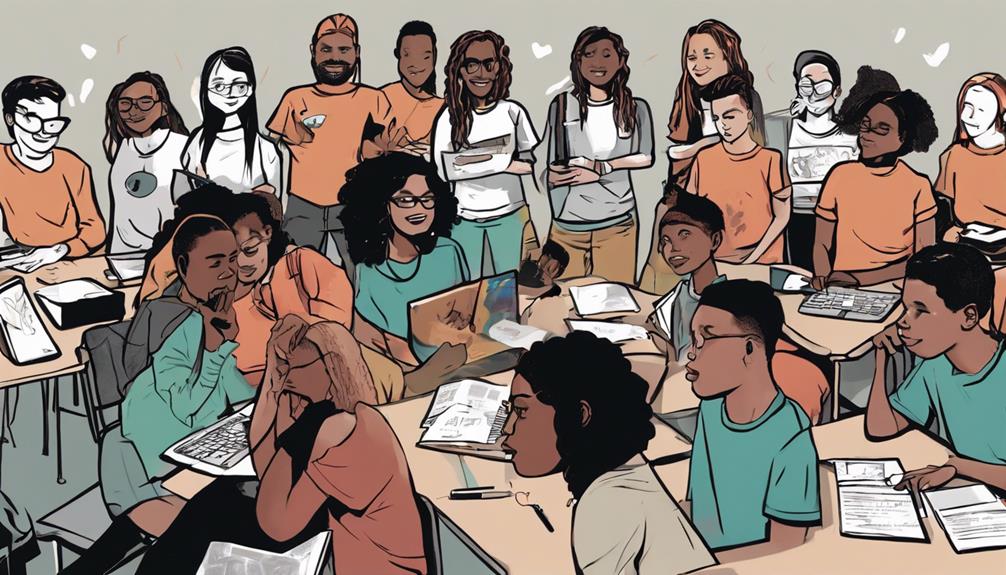
Engage with the Richard Rogers Online Community to stay informed and participate in discussions on educational topics and technologies. Richard Rogers, a Science and Mathematics Teacher, Author, and Blogger, offers valuable insights and expertise in the field.
By joining his Facebook and Twitter pages, you can access updates, share content, and connect with like-minded individuals. Explore his website for additional resources and engage with his posts through comments to deepen your understanding.
Richard's background in Molecular Biology and Mathematics, coupled with his award-winning author status, guarantees high-quality content. Stay updated on new posts, interact with the community, and broaden your knowledge on education and technology by becoming a part of this engaging online platform.
Frequently Asked Questions
How Can Detentions Be Tailored to Address Individual Student Needs?
To address individual student needs, tailor detentions by understanding specific behaviors, offering support, and setting clear goals. Communicate openly about expectations and provide personalized guidance. Follow up with monitoring to guarantee progress and long-term improvement.
What Steps Can Teachers Take to Ensure Long-Term Improvement Post-Detention?
To guarantee long-term improvement post-detention, communicate clearly about expectations, provide ongoing support, and monitor progress. Tailor interventions to address individual needs, reinforcing positive behavior. By taking these steps, you can help students grow and succeed.
Are There Guidelines for Teachers on Administering Personalized Detentions?
When giving personalized detentions, remember they're like keys to reveal student potential. Tailor them for behavior correction and academic growth. Communicate clearly, monitor progress, and offer support. Make detentions a part of your broader classroom strategy.
How Can Detentions Address Recurring Slow Work Rates and Incomplete Tasks?
To address recurring slow work rates and incomplete tasks, detentions can provide focused catch-up time and guarantee task completion. They aim to motivate you to work efficiently and stay on top of assignments.
Where Can I Engage With the Richard Rogers Online Community for Updates?
Explore the thriving Richard Rogers Online Community for all the latest updates and engaging discussions. Connect on Facebook and Twitter, access website resources, and share content across social media platforms for interactive learning experiences!
Conclusion
To sum up, detentions aren't just about punishment but about growth and improvement. By approaching detentions with open communication, personalized interventions, and tailored strategies, students can transform their behavior and academic performance.
So next time you find yourself in detention, remember that it's not the end of the world, but an opportunity to learn and grow. Embrace the potential detentions hold for shaping your educational journey and watch yourself flourish. The possibilities are endless!




